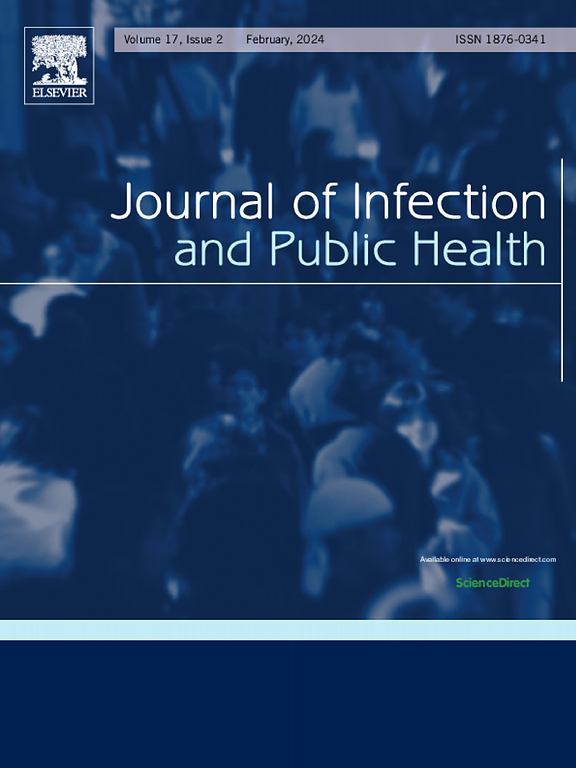Regional risk factors associated with adverse outcomes of COVID-19 infection among the older adult: A systematic review and meta-analysis
IF 4.7
3区 医学
Q1 INFECTIOUS DISEASES
引用次数: 0
Abstract
The rapid global spread of Coronavirus Disease 2019 (COVID-19) has resulted in millions of infections and deaths, particularly impacting older adults. This study systematically analyzes risk factors reported in different geographical regions such as Asia and Europe that are associated with adverse outcomes in older adults with COVID-19. Following Preferred Reporting Items for Systematic Reviews and Meta-Analyses (PRISMA) guidelines, we searched five databases up to December 2023 and conducted meta-analyses of odds ratios for 27 risk factors reported in at least two studies using R software (version 4.3.2). Our meta-analysis identified 19 risk factors linked to adverse outcomes, with many of them common across regions, particularly in Asia and Europe. Key factors include old age (above 65 years), male gender, symptoms such as fever and dyspnea, and comorbidities like dementia, chronic obstructive pulmonary disease (COPD), chronic heart disease, hypertension, chronic kidney disease, and malnutrition. Laboratory biomarkers such as low oxygen saturation, thrombocytopenia, and elevated D-dimer were also associated with adverse outcomes. COVID-19 patients in Asia and Europe who are older adults, male, or have specific symptoms combined with underlying health conditions are at an increased risk of progressing to severe illness or mortality.
与老年人感染COVID-19不良后果相关的区域危险因素:系统综述和荟萃分析
2019年冠状病毒病(COVID-19)在全球的迅速传播已导致数百万人感染和死亡,对老年人的影响尤其大。本研究系统分析了亚洲和欧洲等不同地理区域报告的与COVID-19老年人不良后果相关的风险因素。根据系统评价和荟萃分析的首选报告项目(PRISMA)指南,我们检索了截至2023年12月的5个数据库,并使用R软件(版本4.3.2)对至少两项研究中报告的27个危险因素的优势比进行了荟萃分析。我们的荟萃分析确定了19个与不良后果相关的风险因素,其中许多因素在各地区都很常见,尤其是在亚洲和欧洲。关键因素包括老年(65岁以上)、男性、发烧和呼吸困难等症状,以及痴呆、慢性阻塞性肺病(COPD)、慢性心脏病、高血压、慢性肾病和营养不良等合并症。实验室生物标志物如低氧饱和度、血小板减少症和d -二聚体升高也与不良结果相关。在亚洲和欧洲,老年人、男性或有特定症状并伴有潜在健康状况的COVID-19患者发展为严重疾病或死亡的风险增加。
本文章由计算机程序翻译,如有差异,请以英文原文为准。
求助全文
约1分钟内获得全文
求助全文
来源期刊

Journal of Infection and Public Health
PUBLIC, ENVIRONMENTAL & OCCUPATIONAL HEALTH -INFECTIOUS DISEASES
CiteScore
13.10
自引率
1.50%
发文量
203
审稿时长
96 days
期刊介绍:
The Journal of Infection and Public Health, first official journal of the Saudi Arabian Ministry of National Guard Health Affairs, King Saud Bin Abdulaziz University for Health Sciences and the Saudi Association for Public Health, aims to be the foremost scientific, peer-reviewed journal encompassing infection prevention and control, microbiology, infectious diseases, public health and the application of healthcare epidemiology to the evaluation of health outcomes. The point of view of the journal is that infection and public health are closely intertwined and that advances in one area will have positive consequences on the other.
The journal will be useful to all health professionals who are partners in the management of patients with communicable diseases, keeping them up to date. The journal is proud to have an international and diverse editorial board that will assist and facilitate the publication of articles that reflect a global view on infection control and public health, as well as emphasizing our focus on supporting the needs of public health practitioners.
It is our aim to improve healthcare by reducing risk of infection and related adverse outcomes by critical review, selection, and dissemination of new and relevant information in the field of infection control, public health and infectious diseases in all healthcare settings and the community.
 求助内容:
求助内容: 应助结果提醒方式:
应助结果提醒方式:


